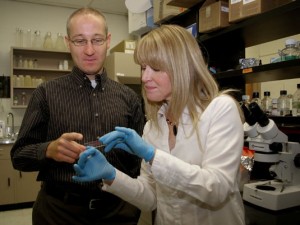
Lisa Porter, right, explains some her research to Bryan Bedard, president of the Katelyn Bedard Bone Marrow Association.
Little Katelyn Bedard’s life ended far too early, but her legacy lives on, partly in the laboratories of Lisa Porter.~
Diagnosed with leukemia just after her second birthday, Katelyn spent almost an entire year in London receiving chemotherapy. Her parents brought their first-born child home to Windsor after the treatments, but at her first check-up one month later, learned she had relapsed. A national bone marrow registry was searched, but Katelyn ran out of time waiting for a match and died in June 2005 at the tender age of three.
“Katelyn was taken from us at a very young age and we never want to see another child’s life cut short the way hers was,” said her father Bryan Bedard, a computer science graduate (Honours BSc 1999) and president of the Katelyn Bedard Bone Marrow Association. “We’d like to spare other families what we experienced.”
Along with his wife Joanne, who is expecting a new baby in April and is also an alum (Honours Geography 1998), Bedard helped found the association that has raised almost $200,000 to date and now includes about 70 volunteers. Besides raising awareness about the registry and providing financial support to families going through transplant procedures, they also generously support bone marrow research.
The association recently gave $5,000 to Dr. Porter’s biology lab, bringing the total amount donated to her research over the last two years to $15,000.
“I’m constantly impressed by the motivation of the Windsor-Essex community to support local health research,” said Porter. “The Katelyn Bedard Bone Marrow Association makes a difference to families across the country and their support has contributed tremendously toward a new research area in my lab with potential toward understanding how certain stem cell populations grow and divide.”
Much of Porter’s research in the area is devoted to studying the fundamental science of why some bone marrow transplants fail. Her team is trying to understand what bone marrow cells need to properly adhere and grow once they’ve been transplanted, how stem cells from core blood samples multiply and grow, and why the genes in those cells can sometimes aberrantly express themselves.
Representatives from the association will be at the CAW Student Centre on Wednesday for the campus health fair, taking cheek swabs from people to determine their eligibility for the bone marrow registry. Bedard said more than 80 people on campus signed up for the bone marrow registry after their last campus appearance.
“It’s a minor inconvenience if you can save someone’s life,” he said of the transplant procedure.
— Stephen Fields
Source: UWindsor Daily News
